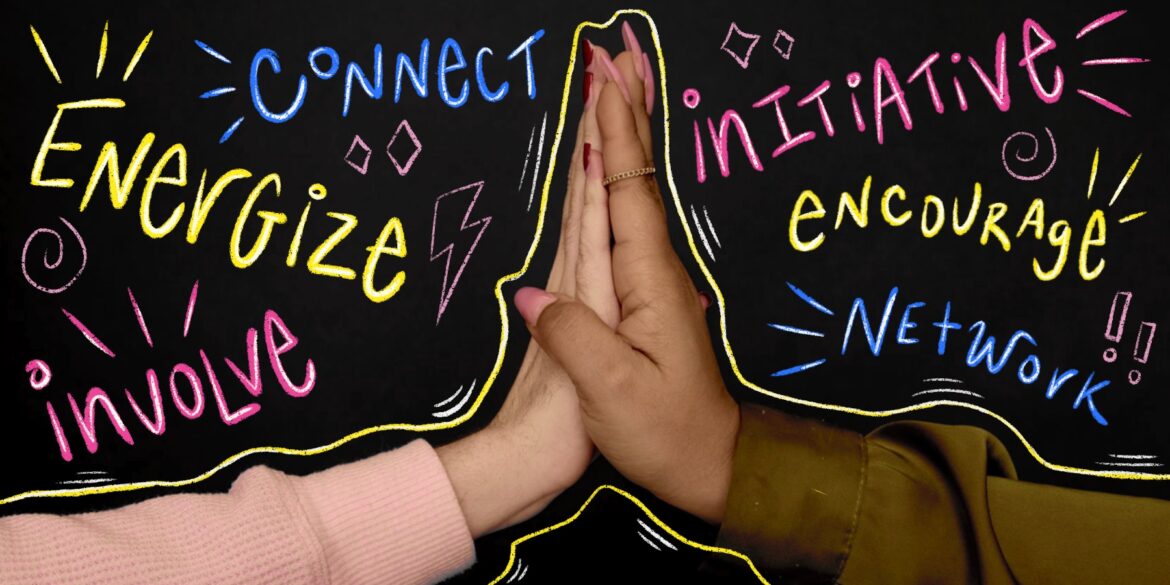What exactly is mentorship? And what does networking look like? As it turns out, it’s not all as cut and dry (or drab!) as we thought it would be—even creatives have mentors! Don’t worry, we won’t knock you for not knowing—it’s not like we’re all gifted with a fairy godmother in a power suit ready to sprinkle professional knowledge like pixie dust (unless you have been, in which case, you can probably stop reading).
Thankfully, there are plenty of pros here in Indy ready to answer all your burning career questions, and we consulted them for the best tips and tricks for mentorship and networking. So, before we dive into all the nitty gritty details, let’s start with the basics!
Networking, Mentoring… What Do These Words Even Mean?
Let’s start with the broader term of networking. Here’s a definition, courtesy of your friends at PATTERN:
Net·work·ing
- : Engaging with other people about work with the intention of knowing other creatives in your field (or adjacent fields!), which can open doors for more opportunities to do cool things, help you become better at your job, or make more $$$.
This could mean anything from adding the first twenty ‘People you may know’ to your LinkedIn network all the way to chatting up executives at a business conference. Often, it just means reaching out and asking someone to have a conversation with you over lunch. This may sound intimidating at first, but keep in mind that these one-on-one conversations don’t have to lead to a sustained, in-depth relationship (though they certainly can!). If they go well, then that’s great! You two can check in with each other on social networks or perhaps even collaborate on a project. And if things fizzle out after the meeting, then oh well! On to the next.
Luckily, there is nothing wrong with going on a series of one-on-one meetings—networking looks different for everyone, and it’s important to figure out what works best for you. For now, though, let’s look at our next definition:
Men·tor·ing
- : Helping or guiding another person in their career.
You might be thinking that mentorship is something that only college students need or benefit from, and we’d like to remind you that that is not the case. Anyone can benefit from mentorship!
Just ask Samantha Burke, the executive director at community mentoring organization Pass the Torch for Women Foundation. While students, according to Burke, may connect with mentors to make the transition into the workforce more seamless, mid-level professionals seek mentorship for different reasons. Burke says these 20-to-30-somethings may want to facilitate intentional conversations around negotiation tactics, navigate difficult workplace conversations, or simply build confidence.
“Mentorship is critical in all stages of someone’s personal and professional journey,” Burke says. “Just think of how you got to where you are today and reflect on the people who encouraged you and offered you guidance along the way—we would not be here indulging in this great conversation had it not been for those great mentors.”
While we’re at it, we’d also like to dust off any preconceived notions of what mentorship looks like. These relationships don’t have to be a chore. Mentors can—and should—be professionals who share similar values and beliefs to you, and who nurture a relationship where you feel comfortable sharing your achievements and goals.
Lauren James, the executive director at Mitch Daniels Leadership Foundation, reminds us that mentor-mentee relationships can look very different based on individual wants and needs.
“Mentorship takes different forms, whether checking in regularly via phone or over coffee, listening and providing guidance through tough situations, to recruiting mentees to serve on boards and committees and also nominating them for awards,” James says. “I also enjoy building community through connecting my network, so many meetings result in at least one, if not more, introductions to someone else as a way to multiple impact. I love celebrating publicly the successes of my mentees through their professional work and personal pursuits too!
How great would it be to have your own personal cheerleader to share your wins with over an afternoon latte? (Of course, there’s some professional etiquette involved, but you can still embrace the encouragement!)
Before we move on, it’s important to note that not every person you network with will become a mentor, but you can’t find your mentor without networking first! In the words of Bryan Kryder, founder and president of marketing company RightHand, “Walk before you run.” He notes that a one-on-one meeting—even just a virtual call—is a great way to determine if a relationship is a good fit.
“I think you need to build a little comfort before you would take the step all the way to mentorship,” Kryder says. “…Then, if the rapport was built… you [can] simply say, ‘Hey, can I have some check-ins with you?’ Or ‘Can I do my resume and send it to you?’ Find a reason why you can reconnect with someone. I feel like mentoring is a form of dating. You wouldn’t get into a committed relationship through a blind communication, right? Some guys do, and that’s weird.”
Define Your Needs + Set Your Goals
First, before you begin your journey of professional connection, take the time to reflect upon what you want and need at this stage of your career.
Some questions to ask yourself are: What am I looking to gain? Who can help me reach my goals? What can I offer the other professional that will make it worthwhile for us to meet? It is important to find these answers so that you are fully prepared before you embark on your quest for professional connection.
Once you’ve done a bit of self-reflection—we recommend taking pen to paper for this—your goals should become more apparent, giving you a conversation topic. And if your goal is to figure out what the hell your goals are, that’s okay too. In that case, it might be best to ask questions, listen, and absorb information. Then, you can determine your own goals at a later date.
Consider the different perks to one-time networking meetings vs. mentorship as you establish your needs. One-time meetings will allow you to quickly expand your creative circle, while finding a mentor will allow for other distinct opportunities.
Professionally, mentorship has the potential to lead into sponsorship, for those who are in creative or innovative fields. You can also find someone who energizes you and impassions you about your work. Your mentor can challenge you, encourage you to think critically about your future within the field, and point to resources needed while holding you accountable.
Going beyond the professional, there is the possibility that your mentor could also provide emotional mentorship. Emotional mentorship manifests as advice for overcoming the mental roadblocks which you may encounter in your profession. When you are facing emotional obstacles such as burnout, imposter syndrome, or even feelings of inadequacy, sometimes advice from a seasoned professional can make all the difference when it comes to conquering them.
All of these things are important to consider before you begin your search. While simple networking can happen quickly, the mentor-finding process is much more involved. Much like Kryder said, finding a mentor is like dating, and when it comes to both mentorship and dating, it’s not a cute look for you if you don’t know what you are searching for.
Start Searching
Once you are confident in your goals and expectations, you may begin your search! Trying to find connections may sound scary at first, but when all of your options are laid out in front of you, it becomes simpler. Some amazing places to begin your search are: LinkedIn, reaching out to alumni from your alma mater, networking events, and community organizations.
Don’t feel like you have to launch yourself into every tactic at once—it’s okay to start small. If you’re not sure how to start, consider making it a part of your routine to attend monthly meetups like CreativeMornings, where plenty of creatives would be more than happy to chat.
While you are combing through these different resources, here are a few things to keep in mind:
- See if your passions, hobbies, and curiosities align with the potential connection. This will make it much easier for you to connect with them, which will help to make the conversation more successful.
- Check if they are innovators in or outside their fields. If you are going to receive advice from anyone, they should be professionals who are passionate and skilled enough to make progress in their expertise.
- Set the bar high. Don’t lower your expectations or standards just so you can meet with someone ASAP or begin the mentor-mentee relationship too quickly—it’s likely that you won’t get what you want out of the connection, and you will have wasted both yours and that person’s time.
As you search, consider using this tip from James—she says that since 2017, she has kept a list in her phone of people she wanted to meet.
“Whether they were speakers at events, thought leaders in the local media, or simply individuals I was fascinated by—if someone excited or thrilled me by what they were doing, I reached out,” James says. “Each Monday morning, I would reach out to someone new on the list letting them know why I admired them and ask if they would be willing to share more about their “why” for planting a flag in the Central Indiana community. It was incredible to me that 99% of the time, they always said yes to the meeting.”
Per James’ advice, keeping a list is an excellent way to keep tabs on professionals you look up to and hope to learn from.
But if social gatherings or “cold messaging” isn’t your thing, consider becoming involved with one of these mentorship organizations to become connected:
100 Black Men of Indianapolis Collegiate Program
100 Black Men of Indianapolis offers the opportunity for college students to become mentors themselves. Through serving as a positive role model for African American youth, mentors support growth and help serve the community—and meet plenty of like-minded peers along the way! Andre Givens, president of 100 Black Men of Indianapolis, says that he finds great value in an honest mentor-mentee relationship, providing both individuals with an avenue to hold the other accountable for achieving excellence together.
Pass the Torch for Women Developing Professionals Program
Join the Developing Professionals Program if you’re looking for 1:1 mentorship, a community of peers from various industries, and to participate in professional development opportunities. Also, if you’re interested, there are opportunities to become a mentor and help others.
EDGE is launching its next cohort of mentoring groups in February. Over the past 10 years, this organization has matched over 1500 individuals ages 22-36 to carefully-curated EDGE|Groups for whole-person development. Through EDGE’s process, mentees are matched to a mentor with life experiences and skills to help them achieve their goals and a group of growth-minded peers to encourage them on their journey.
Kristen Campbell, the director of EDGE Mentoring, says there are distinct benefits to group mentoring. “It provides mentees a breadth of perspectives and experiences, not available through one-on-one. In a group environment, mentees have the chance to develop deep relationships with those in similar life stages and with similar goals. Relatability, and the feeling that you’re not alone, is not only invaluable, but shown to reduce loneliness.”
Reach Out
When you finally find someone to reach out to, it is time to make the first move. Here’s a step-by-step look at what this process might entail:
- Reach out over email, LinkedIn DMs, or another professional platform. Be sure to introduce yourself if you don’t already know them personally.
- Keep it organic. Don’t be fake with someone just to nail them down for a meeting—we’re striving for authenticity here! Everyone loves a good compliment—point out something specific about their work that you really admire, and use that as a jumping-off point for your ask.
- Make your request and be specific about what you are looking for. This way, the person you reach out to can gauge whether they would be a good fit for the conversation.
- Next, before you get down to business, have a short first interaction or a 15-minute phone call. This conversation will be an indicator of how the mentorship will go down the line, so be sure to determine that there is a mutual desire for personal growth and that the individual has the professional and personal capacity to connect. Without any of those qualities, the professional relationship is doomed from the start.
The thought of meeting a total and complete stranger professionally might feel high-pressure or terrifying, even for the biggest extrovert. The hard truth is, sometimes, stepping outside your comfort zone to network can be awkward. You’re not going to mesh with every person you talk to, and that’s nobody’s fault.
According to James, the best thing you can do is keep trying.
“One of my personal mantras is ‘always take the meeting,’” says James. “So when someone asks me to meet, connect, or provide guidance, I always start with yes. Oftentimes a simple yes is the foundation to a beautiful connection.”
Sometimes, you meet with someone, and that’s it. But there is always the possibility that the connection can blossom into a mentorship that helps you and your career grow.
A Few Things to Remember (Before you go!)
- Being in a creative career doesn’t excuse you from standard professional etiquette. Companies that seem lax on the surface—even the ones with ping pong tables and such—still have standards and professional protocols. So dress business casual, arrive on time, and treat others with respect.
- Don’t be stiff if you don’t have to. Sometimes, the vibes really are that chill. But never assume. Let those in charge lead, and then mirror their actions. For example, don’t show up to your meeting five minutes late in your workout gear. But, if the professional you meet shows up in jeans, then assume the next time you meet, you could too, if that’s your jam.
- Meet people where they’re at. If someone would rather Zoom, don’t push them to meet at a local coffee shop. Think of where the two of you can be your best selves.
- Shoot for the stars! Don’t be afraid to reach out to those in higher positions. Sometimes, those people actually receive the least amount of requests to connect, because everyone else is also scared to ask.
- Use your best judgment. Be yourself, and don’t force any relationships that don’t feel natural.
Feel like a networking pro yet? Get out there, send those emails, and see what shakes. You got this!




